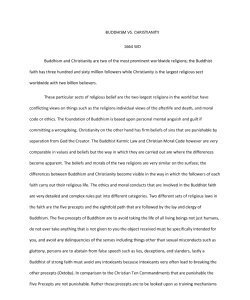BUDDHISM VS. CHRISTIANITY Buddhism and Christianity are two of the most prominent worldwide religions; the Buddhist faith has three hundred and sixty million followers while Christianity is the larges
BUDDHISM VS. CHRISTIANITY Buddhism and Christianity are two of the most prominent worldwide religions; the Buddhist faith has three hundred and sixty million followers while Christianity is the larges
BUDDHISM VS. CHRISTIANITY
1664 WD
Buddhism and Christianity are two of the most prominent worldwide religions; the Buddhist faith has three hundred and sixty million followers while Christianity is the largest religious sect worldwide with two billion believers.
These particular sects of religious belief are the two largest religions in the world but have conflicting views on things such as the religions individual views of the afterlife and death, and moral code or ethics. The foundation of Buddhism is based upon personal mental anguish and guilt if committing a wrongdoing. Christianity on the other hand has firm beliefs of sins that are punishable by separation from God the Creator. The Buddhist Karmic Law and Christian Moral Code however are very comparable in values and beliefs but the way in which they are carried out are where the differences become apparent. The beliefs and morals of the two religions are very similar on the surface; the differences between Buddhism and Christianity become visible in the way in which the followers of each faith carry out their religious life. The ethics and moral conducts that are involved in the Buddhist faith are very detailed and complex rules put into different categories. Two different sets of religious laws in the faith are the five precepts and the eightfold path that are followed by the lay and clergy of Buddhism. The five precepts of Buddhism are to avoid taking the life of all living beings not just humans, do not ever take anything that is not given to you the object received must be specifically intended for you, and avoid any delinquencies of the senses including things other than sexual misconducts such as gluttony, persons are to abstain from false speech such as lies, deceptions, and slanders, lastly a Buddhist of strong faith must avoid any intoxicants because intoxicants very often lead to breaking the other precepts (Oxtoby). In comparison to the Christian Ten Commandments that are punishable the Five Precepts are not punishable. Rather these precepts are to be looked upon as training mechanisms for the Buddhist people. These precepts are not punishable because a large part the Buddhism is intense
